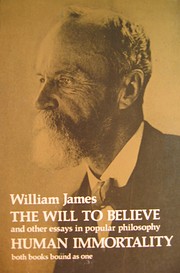

Fai clic su di un'immagine per andare a Google Ricerca Libri.
|
Sto caricando le informazioni... The Will to Believe and Other Essays in Popular Philosophydi William James
 Nessuno Sto caricando le informazioni...
Iscriviti per consentire a LibraryThing di scoprire se ti piacerà questo libro. Attualmente non vi sono conversazioni su questo libro. Hoe moet je leven? Voor de meeste mensen is dat een vraag waarvan de volle reikwijdte langzaam maar zeker tot hen doordringt. Voor William James (1842-1910) was het een opdracht waarmee hij de wereld ingestuurd werd. IN DE WIL OM TE GELOVEN eist William James een geestelijk terrein op voor de menselijke geloofservaring dat zich onttrekt aan iedere rationele bewijsvoering. Iemands geloof wordt eenvoudig gerechtvaardigd door zijn behoefte aan een geloof. James radicale solidariteitsbetuigingen aan de menselijke ervaring maakten van hem tijdens de jaren dat hij aan Harvard doceerde tot een populaire figuur, een filosoof voor gewone mensen. WAT WILLIAM JAMES ook tegenwoordig nog, of misschien juíst tegenwoordig, nog tot zo¿n aansprekende figuur maakt, iemand die we niet los kunnen laten, is zijn aanhoudende pleidooi voor de kracht van de verbeelding in het leven zelf. Wil het leven leefbaar zijn, dan moet de menselijke geest de vrijheid hebben het van binnen uit te vormen alsof het een eigen kunstwerk is, met alle irrationele tegenstrijdigheden van dien. Geloof en bijgeloof, rede en illusie, idealisme en ironie kunnen in zo¿n leven naast elkaar bestaan zonder dat het op een mentale burgeroorlog uitdraait. Kaleidoscopisch als zo¿n leven is, vormt het het beste weermiddel tegen fundamentalisme, of dat nu religious, politiek of wetenschappelijk is. Bas Heijne in NRC FENOMENOLOGISCHE KLASSIEKEN BIJ UITGEVERIJ ABRAXAS AMSTERDAM NBC/Biblion Recensie door Dr. T.A. Smedes Een mooi verzorgde vertaling van een aantal klassieke essays van de Amerikaanse pragmatistische filosoof William James (1842-1910) die cirkelen rondom religieus geloof. James betoogt dat het een recht van ieder individu is om op eigen risico te geloven. Wetenschap en filosofie zouden dit recht moeten erkennen, en niet moeten proberen met behulp van naturalistische verklaringen de ervaringen van gelovigen te ontluisteren. Naast een vertaling van 'De wil om te geloven' zijn in deze bundel ook opgenomen 'Is het leven de moeite waard?', 'Het gevoel van rationaliteit', 'Reflexhandling en theïsme' en 'Religieus vertrouwen en het recht om te geloven'. James' essays verschijnen voor het eerst in Nederlandse vertaling. Een essay van Peter Sloterdijk fungeert als voorwoord, en een zeer leesbaar essay van Hein van Dongen is als nawoord opgenomen. Tevens zijn er een (beknopte) begrippenlijst en register. This book consists of ten essays on various subjects relating to philosophy, religion, and spirituality. Before I started the book I knew I would have to work to get through this kind of subject matter, and I really did have to put in a lot of effort. I realize that he was writing for an audience of academics, but he could have simplified things a bit more for the rest of us. As far as the content goes, sometimes I agree with what he's saying, sometimes I disagree with what he's saying, and sometimes I don't understand what he's saying. Some of the essays were better than others, but on the whole, The Varieties of Religious Experience is probably James' best book, and I would recommend starting with that one if you're interested. nessuna recensione | aggiungi una recensione
È contenuto inContiene
Philosophy.
Psychology.
Nonfiction.
HTML: William James was an important American psychologist and philosopher. He was one of the early academics of psychology and his philosophy touched mainly on pragmatism and the religious or mystic experience. The Will to Believe is a lecture he delivered, which argues that personal belief is a valid basis for hypothesis, in the place of evidence. Following this seminal essay are nine other philosophical essays by James. .Non sono state trovate descrizioni di biblioteche |
Discussioni correntiNessunoCopertine popolari
 Google Books — Sto caricando le informazioni... Google Books — Sto caricando le informazioni...GeneriSistema Decimale Melvil (DDC)100Philosophy and Psychology Philosophy General PhilosophyClassificazione LCVotoMedia: (3.75) (3.75)
Sei tu?Diventa un autore di LibraryThing. |
||||||||||||||||||||||||||||||||||||||||||||||||||||||||||||||||||||||||||||||||||||||||||||||||||||||||||||||||||||||||||
My disappointment is due, in part, to having read William James' "Pragmatism". That series of lectures was very good, which explains my hopes for "Will to Believe". (